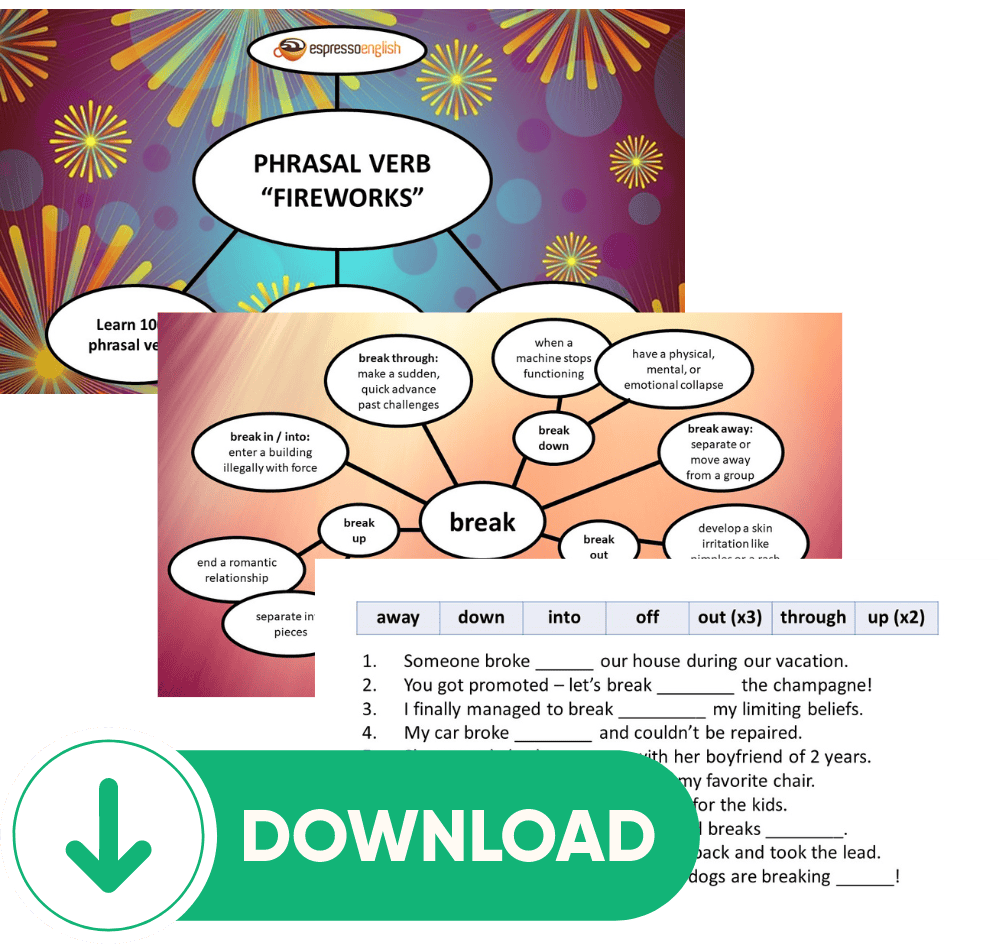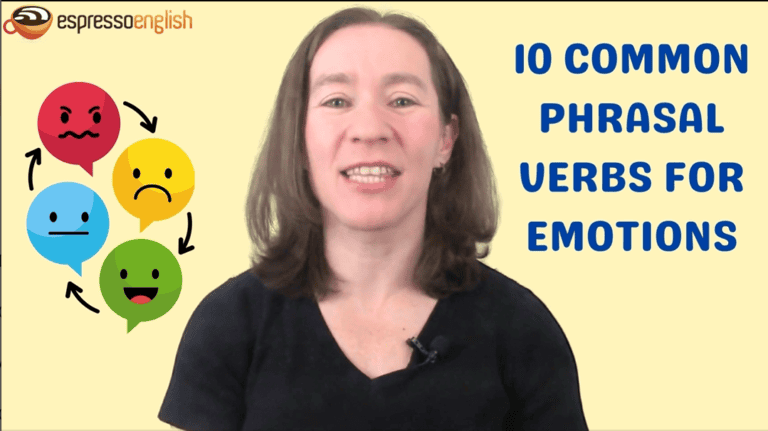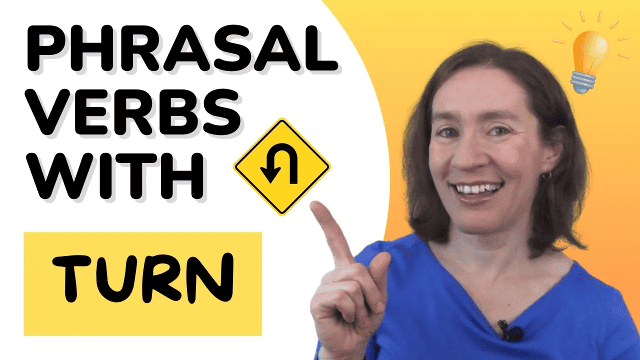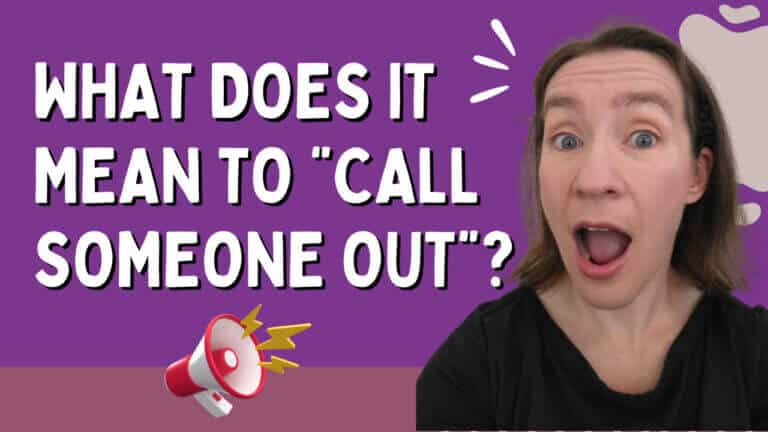
Do you want to learn 100 phrasal verbs in the next 15 minutes?
Get ready, because that’s exactly what we’re going to do! We’re going to go through them fast, so there’s no way you’ll remember them all just by taking this lesson once.
That’s why you should definitely download the free PDF guide so you can review them again and again – and a little bonus, the free PDF also has quizzes to help you practice these 100 phrasal verbs!
Phrasal verbs with BREAK
break in / break into: enter a building illegally with force. This is what robbers do, they break into houses and stores.
break through: make a sudden and quick advance past challenges.
break down:
- It can mean when a machine stops functioning, like if your car breaks down, it stops working.
- If a person breaks down, it means they have a physical, mental or emotional collapse.
break away: separate or move away from a group
break out:
- develop a skin irritation like pimples or a rash
- escape from a confined area like a prison
- break something out means to get something ready for using or consuming
break off: separate something from a larger thing, ex. I broke off a piece of the chocolate bar to give to my children.
break up:
- end a romantic relationship
- or to separate into pieces
Phrasal verbs with BRING
bring about: cause something to happen
bring down:
- cause something to fall or collapse
- if you bring a person down, or if something brings you, down it makes you feel bad or depressed
bring up:
- take care of, educate, and raise a child
- bring up a topic in a conversation = mention that topic, introduce it into the conversation
bring out: develop or emphasize a quality, like if I wear blue, it brings out the color of my eyes because my eyes are also blue.
bring forth: a more formal phrasal verb meaning to create or produce
bring back:
- return something to a place, like bringing library books back to the library
- cause someone to remember, ex. “That song really brings me back to high school!”
bring in:
- move something from outdoors to indoors
- produce or earn money
Phrasal verbs with COME
come across: find something by chance
come about: happen
come along:
- make progress, ex. “Your English is really coming along!” meaning you’re improving
- accompany someone
come out:
- for something to be published or released like a movie or book coming out
- If a person comes out, that can mean reveal that they are gay, lesbian, bisexual or transgender
- to appear, to leave the inside
come by / come over: visit someone
come through:
- provide needed help and support. When I needed to move my apartment, my friends really came through, meaning they provided the help in my time of need
- become seen or obvious
come up:
- appear, like when a problem, issue or topic appears
- approach someone: A beggar came up to me asking for money.
come back: return to a place
come on:
- hurry up, move faster. I often tell my daughter, “Come on, you gotta get ready for school!” in the morning
- stop doing something annoying, ex. “Oh come on, stop tapping your foot. It’s making me crazy.”
come across as: give an impression
Phrasal verbs with FALL
fall behind: not make enough progress to stay on schedule
fall back on: have the option to use something if other plans are not successful
fall apart:
- spontaneously break into pieces
- if a person falls apart it means they become very emotionally upset so that they can’t act normally
fall down / fall over: fall to the ground
fall out:
- fall from an enclosed space, like when you’re a kid, your baby teeth fall out of your mouth
- fall out with a person means to have an argument with someone and stay angry at each other
fall through: when plans fail
fall off: when something separates from a bigger object
fall for:
- fall in love with someone
- be deceived by a lie or trick
Phrasal verbs with GET
get along with: have a good relationship with someone
get away with: do something bad but escape the consequences
get around:
- manage to go places physically
- get around to doing something means you finally manage to do a task, often after some time has passed
get into:
- be accepted by a school, club, etc.
- become interested or active in something, like getting into a new hobby
get over: recover, either physically or emotionally
get through: proceeding with or finishing something difficult
get up: get out of bed, or to go from a sitting/laying to a standing position
get away:
- escape
- to take a short vacation
get by: manage to survive, usually with financial difficulties
get to:
- arrive, reach a destination
- have the opportunity to do something good or special
get back at someone: get revenge
Download 100 phrasal verbs + quizzes
Phrasal verbs with GO
go about: do something
go for: try to get/do something
go under: when a company loses all its money and closes. We could also say “go bankrupt.”
go over:
- get acceptance or approval from a group
- to review – right now we’re going over lots of common phrasal verbs
go down: sink or decrease in level, price, or value
go on: happen, proceed, or continue
go around: move here and there, from place to place
go out with someone: be dating, romantically involved
go through: experience, especially when you experience something difficult
go with: select or choose. Like if I’m trying to buy a new dress, I might say, “I think I’ll go with the black one.”
go up: increase in level, price, or value
go off:
- when an alarm or siren makes noise, like my alarm goes off in the morning to wake me up
- when a bomb explodes
go by: to talk about time passing
Phrasal verbs with GIVE
give off: emit or send out a smell, energy, or feeling
give in: stop resisting and agree to do what someone else wants
give away:
- offer or provide for free, like I’m giving away the free download of this lesson
- reveal or make known
give out:
- distribute, like a cookie shop might give out free samples
- if something gives out, it stops functioning, it becomes exhausted, or it has no more energy
give up:
- stop trying or doing; to abandon an effort
- stop possessing something
give back:
- return something to someone, so if I borrow my friend’s camera, I will need to give it back
- giving time or money to charity
Phrasal verbs with PICK
pick up:
- take something with your hand
- take passengers in a vehicle
- improve or increase – If I say the wind is picking up, that means the wind is getting stronger
- buy; ex. you pick up some milk at the store
- detect
- continue after a break
- get knowledge by learning or experience. I hope my lessons are helping you pick up English!
pick on someone: tease or bully someone
pick apart: criticize or find fault
pick through: search within a collection or mess of things
pick out:
- choose or select
- identify something specific from a group
pick at:
- pull with your fingers or nails
- if you pick at your food it means you eat only little bits, almost like you’re not very hungry
Phrasal verbs with PUT
put away: put something in its proper place
put aside: stop using or considering something until later.
put off:
- delay doing something or procrastinate
- if something puts you off, it means it makes a bad impression on you
put on:
- starting to wear clothes, accessories, or makeup
- produce a show or performance
put out:
- extinguish a fire or extinguish a cigarette
- put out publications, publish them at a regular frequency
- if someone is put out, it means they are inconvenienced
put through: cause someone to experience something
put up with: tolerate something annoying or difficult
put forth / put forward: offer or propose for consideration
put down:
- write something on a piece of paper
- put someone down means to criticize and humiliate the person
- put an animal down means to kill an animal that is old or sick and suffering
put back: return an object to the location it came from
Phrasal verbs with SET
set aside: separate and reserve something for a special purpose
set apart: make something noticeable and distinct from others
set off:
- cause to occur, especially an explosion, reaction, or alarm
- begin a journey
set out:
- begin a journey, ex. We set out/off on our hike at six o’clock in the morning.
- start an effort or project
- put things on display for showing or sale
set in: begin to have an effect or begin to happen, especially when talking about seasons, feelings and trends.
set back: delay or prevents from moving forward
set up:
- physically assemble something and put it in a standing position, like setting up a tent
- establish something and get it ready for use
Download 100 phrasal verbs + quizzes
Phrasal verbs with TAKE
take in: receive and understand information.
take after someone: have a similar appearance or personality as one of your relatives
take on:
- accept work or responsibility
- hire or employ someone
- fight or compete against someone
take over: take control or become dominant
take off:
- an airplane going up into the air
- become successful or popular fast
- leave a place suddenly (informal)
- remove something, like take off a hat or jacket
- take time off means not going to work for a time, ex. I’m taking a week off to travel.
take back:
- return something to a place
- if you take some of your words back, it means you admit that something you said or wrote was wrong
take up:
- fill space and time
- start doing an activity regularly
take apart: separate something into parts.
Phrasal verbs with TURN
turn away: not allow someone to enter/access a place. If the club is full, they will turn people away at the door.
turn around: change direction and go the opposite way
turn down:
- decrease the volume or the heating or air conditioning
- not accept an invitation or offer; to say no to it
turn in:
- go to bed
- give an assignment to a teacher or supervisor
- deliver someone who committed a crime to the police
turn into: become
turn out: have an end result
turn up:
- increase volume, heating or AC
- appear
turn over:
- transfer something to someone in authority
- flip something to the other side
turn on:
- make someone sexually aroused
- start or activate a machine, light, or electrical device
turn off:
- stop or deactivate a machine, light, or electrical device
- make someone lose interest
We went through 100 phrasal verbs really quickly, so make sure to download your free PDF guide! Not only will it help you remember the phrasal verbs, it will also help you practice them with those quizzes so you can test yourself and make sure you’ve learned them well.
The English language has thousands of common phrasal verbs, and I can help you learn them easily and naturally inside my Phrasal Verbs in Conversation Course!











